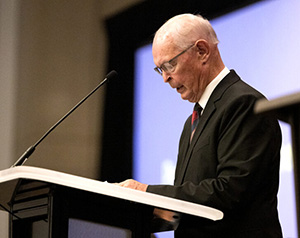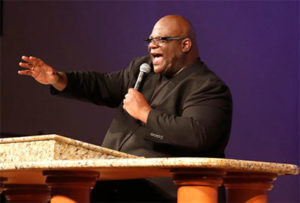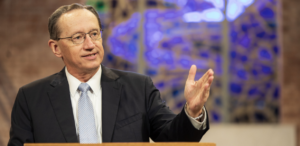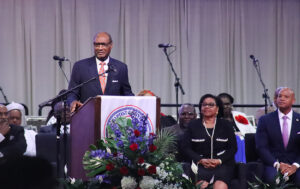Layman Owen Cooper made significant impact on SBC
YAZOO CITY, Miss.—Owen Cooper wasn’t a Baptist when he left for college, intending to be a Presbyterian as was his mother. But Bible-reading led the young Mississippian into a faith journey that helped shape Southern Baptists during the latter half of the 20th century.
He did so as a layman who founded a large-scale fertilizer plant.
Fifty years ago, Cooper ended two terms as president of the Southern Baptist Convention—among only a few laymen ever elected to the office. His legacy includes casting a vision for the SBC-wide Bold Mission Thrust initiative that aimed to share the gospel with every person in the world by the year 2000.
Emphasized importance of laity
Owen Cooper regularly underscored the importance of laymen as he visited every state in the union during his SBC presidency, along with an array of mission fields.
In his presidential address to the 1974 annual meeting in Dallas, he asserted, “The greatest apostasy” of the past century was “the perpetuation of the nonbiblical concept that the burden for evangelism and missions lies only with the full-time Christian worker and that the ‘layman’ has little responsibility.”
“Lay people are expected to occupy the church pew, to fill the offering plate, to teach a Sunday School class, to attend Church Training [the former Sunday evening discipleship hour] but otherwise are seldom challenged by the church program,” Cooper said.
In his 1974 book The Future Is Before Us, published by the convention’s Broadman Press, he insisted, “You will never know the abundant life, you will never find fulfillment in your church membership, and you will never know the peace that passeth understanding until you minister even as you are ministered unto.”
Cooper brought a layman’s demeanor to his presidency, as noted by the SBC Executive Committee’s lead administrative assistant, the late Martha Gaddis.
“The other presidents and their wives I called ‘Dr. and Mrs. So and So.’ From the very beginning the Coopers said: ‘We’re Owen and Beth. Don’t call us anything else,’” she recounted in a 1992 book about Cooper, The Thought Occurred to Me by the late Don McGregor, editor emeritus of the Baptist Record in Mississippi.
Humble beginnings
Cooper grew up as a farm-boy near Vicksburg, Miss., chopping cotton and milking cows. While a student at Mississippi State University, preparing to teach high school vocational agriculture and paying his way by beekeeping and delivering newspapers, he was elected as president of the statewide Baptist Student Union.
As a vo-ag teacher in his early 20s in the Mississippi Delta town of Leland, Cooper became the Sunday school superintendent at First Baptist Church and served on its pastor search committee.
After earning a master’s degree in economics and political science at the University of Mississippi, he pursued a law degree from the Jackson School of Law (now part of Mississippi College, a Baptist school). As a member of Jackson’s First Baptist Church, he became the Baptist Student Union director at two colleges in the state capital, Belhaven, affiliated with the Presbyterians, and Millsaps, affiliated with the Methodists.
Cooper moved to Yazoo City, 50 miles northwest of Jackson, while working to establish the nation’s first farmer-owned nitrogen fertilizer plant, Mississippi Chemical Corporation, which opened in 1951, in a cooperative venture involving the Farm Bureau, farmers and their banks throughout the South and federal loan officials.
He joined First Baptist Church in Yazoo City, taking on the role of Sunday school superintendent and knocking on doors in weekly home visitation and revival campaigns. He was moderator of the Yazoo Baptist Association before becoming president of the Mississippi Baptist Convention. As a longtime member of the SBC Executive Committee, he was elected as president of the Southern Baptist Convention in 1972.
Call to engage in evangelism
Cooper’s advocacy for Baptist laymen typically was voiced alongside an insistent call for evangelistic fervor throughout the SBC.
In his 1973 presidential address on the “Share the Word” theme at the SBC annual meeting in Portland, Ore., Cooper said Baptists must witness “in our kitchen, in our dining room, in our den and in our living room … in our front yard and across the fence in our backyard.”
“It means we should witness to our neighbors next door and to our neighbors who live around the world,” he said. “It means we should witness where we work, where we shop, where we bank, where we play and where we make our social contacts … when we travel, when we are on vacation, when we are on a business trip, attending a conference, at the civic club, at the country club, at the hunting club, at the social club and at the garden club.”
He continued: “We should also witness to the uttermost parts of the earth …to the rural settlement, to the village, to the town, in the city, and in the metropolis. We should witness in the townhouses, and in the ghetto, in the single-family residence, and in the high-rise, in the row house and in the tenant house.”
As SBC president, Cooper initiated a 21-member Missions Challenge Committee in 1974 that brought a report to the 1976 annual meeting in Norfolk, Va., calling Southern Baptists into a 25-year Bold Mission Thrust effort encompassing numerous international and home missions initiatives.
The late Albert McClellan, the Executive Committee’s associate executive secretary, wrote to Cooper in 1977: “I remember quite vividly that the whole concept of the Missions Challenge was your idea. You stirred it up in the [former] Committee of Fifteen and fixed it so that it would become clear to Southern Baptists that we needed to go forward in missions.”
Passion for missions
Reflecting his passion for missions and his entrepreneurial spirit, Cooper took an interest in India, leading several U.S. fertilizer companies and the U.S. Agency for International Development to pioneer large-scale fertilizer plants in the populous Asian nation.
He then launched an organization to support Indian evangelists, naming it Universal Concern.
He also raised funds to rehabilitate the cemetery where missions pioneer William Carey is buried.
Creating an Agricultural Missions Foundation, Cooper worked with farmers to nurture their missions involvement by shipping beef and dairy cattle, hogs, rabbits, seed, tools and a tractor to Southern Baptist agricultural stations in Ecuador, Liberia, Rhodesia (now Zimbabwe), the Philippines and other locations.
Promoted race relations
In civic affairs, as executive director of the Mississippi Farm Bureau Federation in the 1940s, he led an effort in the state legislature to create the Mississippi Commission on Hospital Care, which he then chaired, approving the construction of more than 100 rural hospitals.
During the 1960s, Cooper bridged racial lines, accepting the chairmanship of an organization to lift the state’s Head Start program from bankruptcy. Called the Mississippi Action Project, the board consisted of an equal number of whites and blacks, including the NAACP state chairman.
Cooper acknowledged to friends that his Head Start involvement would derail his long-held goal to someday run for governor of Mississippi.
Within the SBC, Cooper often voiced concern about race relations, drafting a 1972 resolution, for example, expressing “gratitude to God for the progress being made in an increasing number of our churches where persons of other races are welcomed into all areas of church life and fellowship.”
Cooper never was shy about tying an evangelistic exhortation to his Mississippi roots as well as his business interests, noting in The Future Is Before Us: “We need to be challenged by the fact that as Christians it is our responsibility, not our privilege, it is our obligation, not our wish, it is our duty, not our desire to see that the gospel is preached throughout the world.”
Cooper died in 1986 at age 78.









